
Latest News.
Does Paypal has too much ‘market power’? German federal cartel office opens proceedings.
Everyone knows about the payment option “PayPal”. For consumers, it seems to be uncomplicated, secure and above anything else, free of charge. But that is not the case for sellers. Because if the buyer chooses the PayPal payment method, fees are charged. This is not a problem. Other providers also charge fees. However, PayPal’s terms of use could be critical. It is precisely these terms of use that are now the subject of proceedings by the Federal Cartel Office. The Bundeskartellamt fears that Paypal has too much market power due to its own terms of use. This could result in the obstruction of competitors and the restriction of price competition.
If other payment methods are cheaper for the seller, it is obvious that the seller prefers them. Theoretically, it is possible to influence the buyer in his choice of payment method. But this is exactly what the PayPal terms of use in Germany exclude. Here, “rules on surcharges” and on the “presentation of PayPal” are regulated. According to these rules, sellers are not allowed to offer their goods at a lower price when choosing a payment method other than PayPal. In addition, sellers are not allowed to point out the fees charged by PayPal or otherwise buyers in their choice of payment option. This would be possible, for example, by offering a faster and more convenient contract conclusion. It was precisely these rules in the terms of use that made the Bundeskartellamt suspicious.
The Bundeskartellamt’s proceedings are based on Article 102 TFEU and Section 19 GWB. According to these, there is an antitrust prohibition on the abuse of a dominant position or, according to Section 20 GWB, a position with market power. In addition, according to the Bundeskartellamt, a violation of the prohibition of agreements restricting competition pursuant to Article 101 TFEU and Section 1 GWB is possible. According to the Bundeskartellamt, it will examine what market power PayPal has. In addition, it is to be clarified to what extent sellers on online platforms are dependent on offering PayPal as a payment method.
Because if merchants are prevented from taking into account the different costs that arise from the choice of a payment method and passing them on to the end customer, it could become problematic. In that case, other payment methods can compete only with difficulty or not at all. As a result, the payment services with market power could charge even higher prices for their service.
In the end, it would be the consumers who would have to pay for this situation. After all, no merchant omits the costs for the payment method from his price calculation, even if, unlike shipping costs, they are not visible on the statement. If no cheaper payment service provider prevails or the prices are even increased, the costs for the payment option remain in the calculation of the seller. And these are simply borne by the buyer. Currently, the costs are between 2.49 and 2.99 per cent of the amount to be paid and an additional 34 to 39 cents per transaction. According to market studies, PayPal is one of the most expensive online payment services on the German market. It remains to be seen whether the Bundeskartellamt will ultimately allow other, cheaper payment service providers to assert themselves on the market.
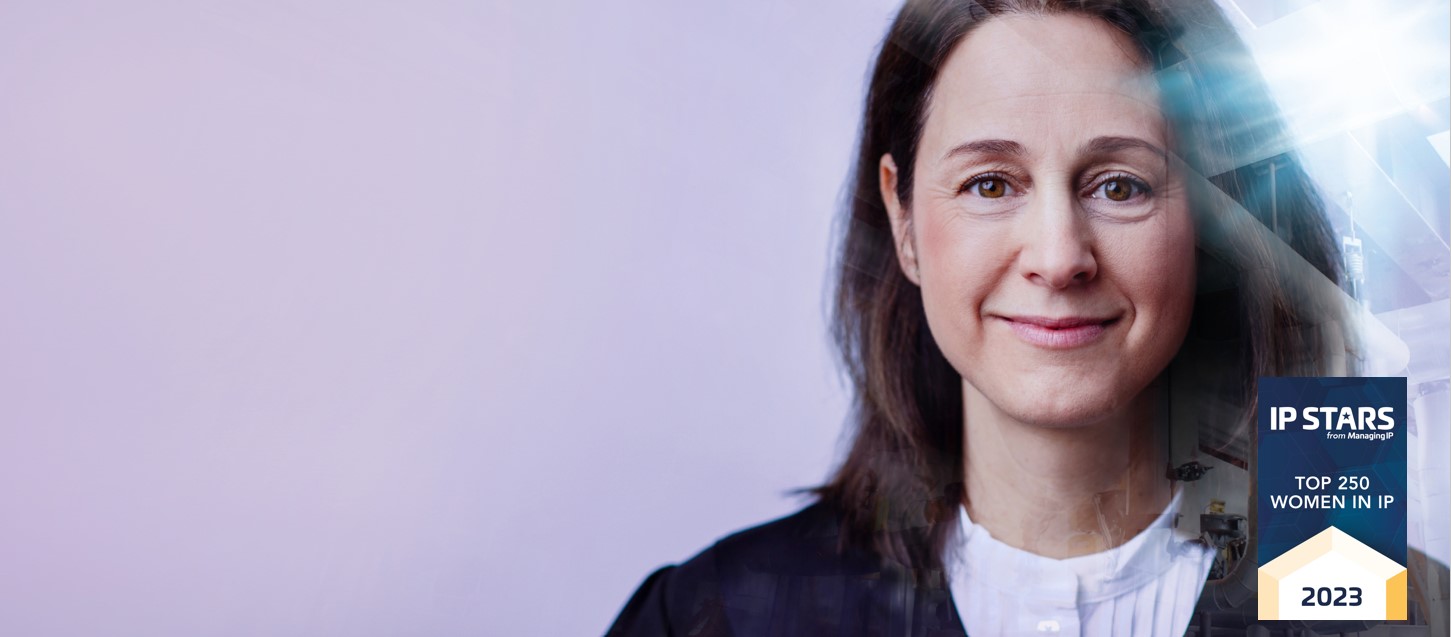
Latest News.
Managing IP Stars 2023: Miriam Kiefer among the top 250 women in IP
Congratulations to our Managing Partner Miriam Kiefer LL.M., who was recognized for the fourth consecutive year as a leading IP attorney in Managing IP’s international “Top 250 Women in IP” directory in the IP Stars 2023 rankings.
The list honours experienced female IP lawyers and IP litigators who have provided exceptional services to their clients and companies in the past year.
This year’s reference list includes more than 30 areas of law worldwide, for more information and access to the full ranking, click here.
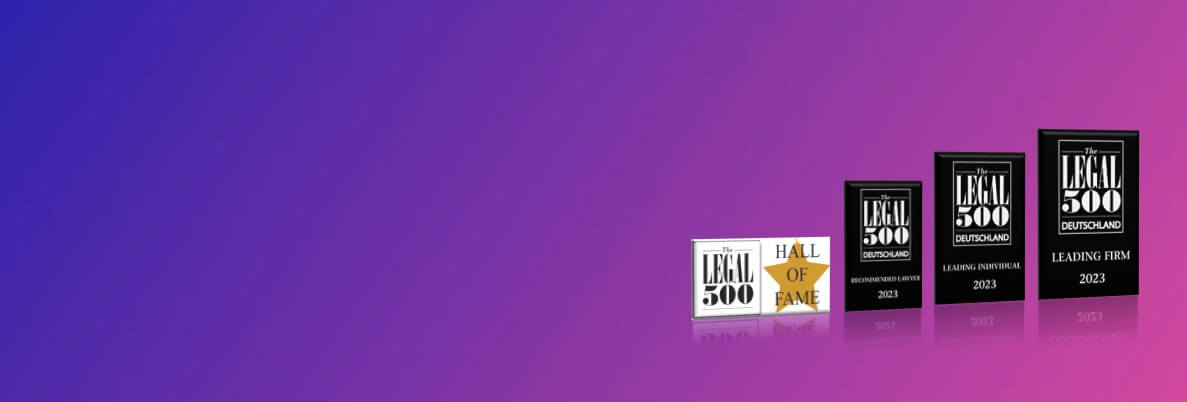
Latest News.
The Legal 500 Germany Ranking 2023: Kather Augenstein again ranked as one of the leading law firms in patent litigation
Kather Augenstein is again honored by The Legal 500 Germany as a “Leading Law Firm” in the field of Intellectual Property – Patent Litigation. The annual award recognizes law firms and individual attorneys worldwide for their outstanding achievements, based on feedback from clients, peers and colleagues.
Some of them describes us as a “highly skilled team that handles cases quietly, competently and with focus in a very human and pleasant manner”, as well as a “very effective and efficient team, both in smaller and larger cases.” Miriam Kiefer is confirmed as having a “trusting, humanly very pleasant, close and very well coordinated cooperation in a number of infringement cases, expert reports and SPC proceedings”.
According to the editorial team, one of the numerous strongest IP boutiques in Germany is the Kather Augenstein team in Düsseldorf, whose broad advisory portfolio in patent law context is reflected in the individual focuses of the central experts.
Partner Dr Christof Augenstein, for example, is more active in the fields of electronics, telecommunications, medicine and automotive, while senior partner Dr Peter Kather sets strong focuses on cross-border proceedings. Managing Partner Miriam Kiefer, who is well-versed in medical technology, heads the team of lawyers, which also includes the Partners Christopher Weber (who focuses on software, electronics, pharmaceuticals, chemicals, mechanics and plastics processing) and Sören Dahm, who is well-versed in technology-related, often cross-border matters. The core team also includes Dr Benjamin Pesch and his focus on computer-implemented inventions, who was been appointed as counsel in July 2022.
As last year, we are pleased that our Senior Partner Dr. Peter Kather has been inducted into the Hall of Fame category again and that our partners Christof Augenstein and Christopher Weber have been recognised as Leading Names for the second time.
About The Legal 500
The Legal 500 has been published for the past 36 years and is widely recognised as the world’s most comprehensive legal handbook. Over 300,000 in-house lawyers worldwide are surveyed and interviewed each year.

Latest News.
Adidas and its stripes
Adidas is known for its trademark lawsuits. The German sports giant is always on its guard when it comes to the designs of its competitors. In January, another exciting judgement was made on the famous three stripes.
The facts of the case date back to 2007. At that time, Adidas complained about Thom Browne’s three-stripe design. The latter showed understanding and changed to the four-stripe design. A few years later, it was clear that this was not enough for the German sportswear manufacturer. However, the dissatisfaction only came to a head when Thom Browne began to achieve great success and establish itself in the sportswear business. In June 2021, Adidas sued Thom Browne, seeking to prohibit him from using stripes and to obtain a payment of more than $7.8 million. The judgement was handed down in January 2023.
Adidas’ complaint: Thom Browne’s design was too similar to the brand’s own three-stripe design and therefore constituted an infringement of its own trademark rights. In fact, Tom Browne usually uses four stripes in his creations that enclose an item of clothing. The stripes border socks, for example. The designer demonstratively wore such socks to the court hearing. According to Adidas, Thom Browne uses the four stripes to draw attention to the sportswear he designs. In this way, he exploited Adidas’s fame. This has led to cooperations with athletes, such as Lionel Messi. Lionel Messi had previously been an Adidas ambassador. Thom Browne defended himself with the argument that stripes are a common design element for clothing. He also served the luxury goods market, so there was no direct competition between the two companies.
The jury concluded that Adidas could not prove that Thom Browne had infringed the sports giant’s trademark. The reason given for this was the different number of stripes – four stripes instead of three, which ruled out a likelihood of confusion.
This result was not to be foreseen. The case law, which has often dealt with the three stripes, decides depending on the individual case. In 2016, the European Court of Justice (ECJ) affirmed a likelihood of confusion in the case of a trade mark that used two stripes instead of three. However, in 2019, with the same opposing party, the ECJ ruled that the three stripes was rightly cancelled from the register as an EU trade mark. It may be surprising at first that the judgments are different in what at first sight appear to be the same case. According to the court, the small but subtle difference lay in the arrangement of the stripes, i.e. the design decision.
The first case concerned three diagonal stripes on trainers. Here, the court recognised a likelihood of confusion for consumers, because Adidas used diagonal stripes typical of the brand, especially on trainers, an iconic recognition value. The second case involved three vertical black stripes on a white background. According to the court, consumers do not necessarily associate this with Adidas. It was simply a decorative element that was not associated with any brand. According to the court, Adidas could not prove the opposite.
Adidas shows great disappointed after the current ruling and indicates that it will not hesitate to take legal action. The company is very concerned about defending its own intellectual property. Past decisions have shown the finer points that can matter.
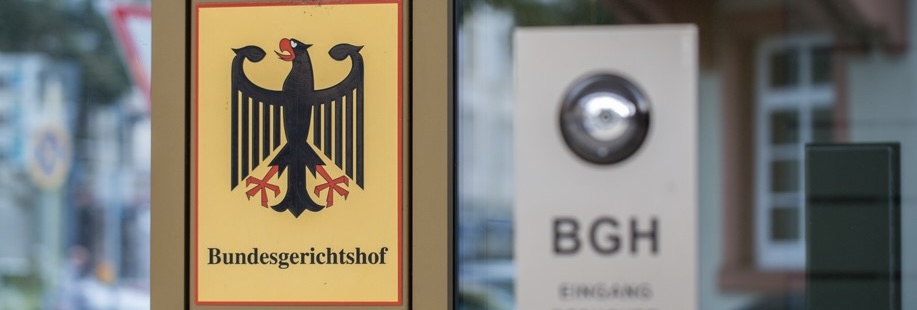
Latest News.
Heitec vs. Heitech Kather Augenstein succeeds with landmark decision in trade mark law before the Federal Court of Justice (BGH)
In the trademark infringement proceedings between HEITEC AG and HEITECH Promotion GmbH, the European Court of Justice has confirmed our legal views in its judgement of 19 May 2022.
The Federal Court of Justice has now also ruled in favor of our client, Heitech Promotion GmbH, in the specific case, so that the action brought by Heitec AG has been dismissed with final effect.
Trade mark owners must therefore follow up on infringements within five years at the latest, otherwise their claims are forfeited, including secondary claims such as damages or recall. In particular, out-of-court measures do not extend this time limit if the trade mark owner does not go to court within a reasonable period of time. Detailed information on the facts of the case and the reasons for the decision can be read again here and in our blog post.Both decisions are expected to shape case law in the coming years on the issue of forfeiture in trade mark law, as decisions of the highest courts, in particular involving the ECJ, are extremely rare.
“We are pleased that the Federal Supreme Court has now also followed our view and that we were able to bring this legal case to a successful close after almost nine years,” said Dr Christof Augenstein. “It shows that Kather Augenstein is also a first address for complex trade mark disputes.”

Latest News.
An Amazon for pharmaceuticals is not lawfully
In its judgement (decision of 8.12.2022 – 13 O 17/22 KfH), the Regional Court of Karlsruhe ruled that the provision of an online platform for pharmacies is not permitted, if the marketplace operator charges pharmacies a basic fee or a transaction fee. The court granted the pharmacy association, acting as plaintiff, the right to prohibit the operation of such an online marketplace.
Online marketplaces are convenient. And thus also very popular. Hardly anyone can claim never to have bought a product via Amazon or E-Bay. Therefore, the idea – to provide online marketplaces offering health products and services as well – seems quite obvious. Especially in view of the gradual introduction of the e-prescription in Germany, which has already been initiated on 1 September 2022, providing an online marketplace for pharmacies sounds more like a necessity than an innovation.
However, this should not be done on any terms, according to the Karlsruhe Regional Court. In the present case, the plaintiff intended to charge a monthly basic fee for use of its platform as well as 10 % of the net sales price for products that were not purchased on a prescription. The Chamber of Pharmacies had issued a warning to the plaintiff and demanded that it cease and desist from this construct.
The Karlsruhe Regional Court gave the Chamber of Pharmacies the right to demand that the marketplace operator cease and desist. The decision is based on §§ 8, 3a UWG in conjunction with § 11 para. § 11 para 1a ApoG. The judges ruled that the marketplace operator acted unfairly because it brokered prescriptions to pharmacies and accepted or was promised an advantage in return.
According to the judges, the decisive factor is that the online marketplace operator can display the products and services in a self-selected order to a buyer who enters a search term. Through this, the marketplace operator would “broker prescriptions”. For this service, the marketplace operators contractually insured the payment of the basic fee, which violates Section 11 (1a) ApoG.
The court’s decision was supported by the protective purpose of the provision. In this context, the judges referred to the legal justification of Section 11 (1a) ApoG and explained that the primary purpose was to protect the “general interest in ensuring a proper supply of pharmaceuticals to the public”. 1a ApoG und erläutern, dass es primär darum ginge, das „Allgemeininteresse an der Sicherstellung einer ordnungsgemäßen Versorgung der Bevölkerung mit Arzneimitteln“ zu schützen. For this purpose, a network of pharmacies close to the place of residence is necessary. This network could also be endangered if the established pharmacies were under pressure to offer the products for sale in an online marketplace. This could potentially threaten local sales.
On the other hand, paying 10% of the net purchase price of the products to the marketplace operator violates § 8 ApoG. In the second sentence of the provision, it is stated, among other things, that rental agreements based on turnover or profit sharing are not permitted. This is exactly what the court saw in the 10% agreement. According to the court, a classical rental agreement is not necessary to violate the provision. Rather, it was sufficient that the contract concluded resembled a tenancy agreement. In the contract between the pharmacies and the online marketplace operator, the judges saw a contract with elements of a rental agreement, because a digital sales space was made available. And for this, money had to be paid, which is prohibited by the norm.

Latest News.
MIP Ranking: Dr Benjamin Pesch is awarded “Rising Star 2021” by leading specialist guide Managing Intellectual Property
We are pleased to announce that Dr Benjamin Pesch has been recognized as a “Rising Star 2021” in Gerrmany in the recently published edition of Managing IP.
This publicationfeatures the best up-and-coming IP practitioners in the field of patent litigation who have contributed to the success of their firms and their clients. We congratulate Benjamin on this award!
Managing Intellectual Property has already named the following Kather Augenstein IP practioners asIP Stars 2021 in Germanythis year.
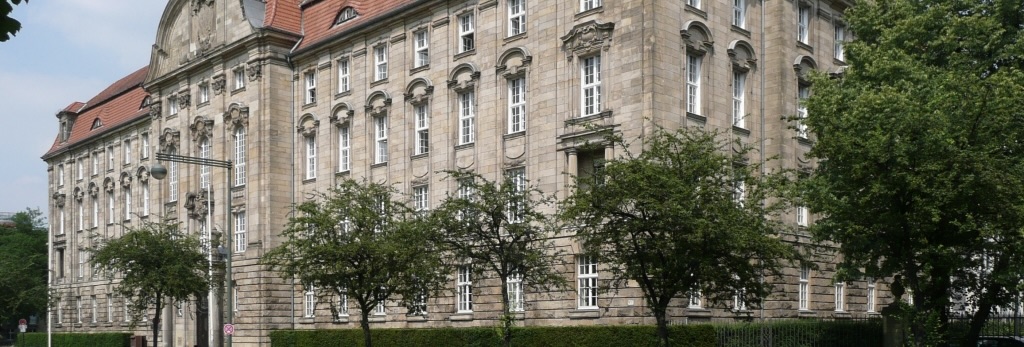
Aktuelle News.
HIgher Regional Court (OLG) Düsseldorf: Patent infringing offering by naming a reference object and other concerns
OLG Düsseldorf, judgement of 15.07.2021 – 15 U 42/20 In its decision, the 15th Senate had to solve several problems at once. The defendant contested not only patent-infringing conduct, but also the capacity to sue due to the formal invalidity of the declaration of assignment and invoked the disproportionality of the recall claim.
I. Facts
The patent in suit concerns a so-called workshop and repair pit in the form of a single- or multi-part cassette. The special feature of the protected pit is two water collecting channels which extend along the upper boundary of the longitudinal side walls and are covered by grates. The collection channels catch water running off the vehicle and dispose of it. The grates ensure trafficability.
The plaintiff has been the pantent holder of the patent-in-suit since 2017. By written agreement, the original holder granted the plaintiff a non-exclusive license free of charge and assigned to it all past and future claims for damages and disclosure. The defendant designs, calculates and sells workshop pits under the name P. The pits can be configured modularly and can be delivered and assembled by the defendant.
A project was advertised for the installation of a workshop pit at a motorway maintenance. The corresponding invitation for tenders provided for “drainage channels on the left and right” for the pit to be constructed, as well as the inclusion of drivable gratings. After submitting a bid, the defendant was awarded the contract. The construction plans prepared thereafter were marked with the defendant’s logo.
The pit that was eventually installed at the motorway maintenance indisputably realizes all the features of the main claim, so it also has water collection channels and grates. The defendant advertised the pit installed there on its website by stating that they supplied the “complete technical workshop equipment, inter alia a “P. According to the advertisement the pit consisted of a steel Finished Work Pit with Roll Cover, Drainage Channels and Waste Oil Disposal”.
There was therefore a consensus that the defendant had supplied a pit. What remained in dispute was whether the defendant also supplied and installed the water collection channels and walkway grates.
II. Higher Regional Court fully confirms the decision of the Regional
Like the Regional Court, the Higher Regional Court affirmed the capacity to sue with reference to the fundamental freedom of form of the declaration of assignment. The transfer of annex claims as a material transfer agreement is possible without any form even if the causal transaction underlying the assignment required form.
The Higher Regional Court judged two actions to be patent infringing. Firstly, it considered advertising with a patent-infringing reference object to be an offer within the meaning of § 9 Patent Law (Patentgesetz). The defendant thus gave the impression that it could supply such a pit. The decisive factor was that the public could infer the non-advertised features from other objective aspects. The decisive factor was that the public could infer the non-advertised features from other objective aspects. That is why the free accessibility of this information was irrelevant. Secondly, the submission of the offer, since it was made in response to the invitation for tenders, also constituted an offer within the meaning of the Patent Law as it prepared and promoted the conclusion of a contract for a pit with precisely these patent-infringing properties.
Without taking evidence, the Higher Regional Court came to the conclusion that the defendant also supplied the water collection channels and the grates and thus put a patent-infringing pit on the market. It did not consider the facts presented by the plaintiff to be in need of proof, as the defendant had not countered the plaintiff’s submission with sufficient substantiation. The plaintiff’s extensive and conclusive submission (inter alia, entering into the contractual obligation to supply in accordance with the invitation for tenders; construction plan with defendant’s logo; billing with pit type designation in accordance with the invitation for tenders) was countered by a blanket assertion that the defendant’s managing director had pointed out that the defendant could not or would not deliver a pit with channels and grates. Particularly in view of the submission of the tender in response to the specific invitation for tenders, this did not convince the court.
The defendant had argued for the first time on appeal that the recall was disproportionate because the disassembly would be very costly and would lead to the complete destruction of the system. It is therefore not to be expected that customers would comply with the recall. However, the defendant did not provide a reason for the alleged destruction. The Higher Regional Court rejected the objection as being out of time and also saw no evidence for the recall being disproportionate. Since a recall claim only required a serious request to the commercial owners and not a successful recall, it was irrelevant that the recall might prove unsuccessful. In addition, the milder remedy of removing the channels and grates was not equally effective, as this would only be a temporary remedy. In accordance with the established Düsseldorf ruling practice, the Higher Regional Court also found a claim against commercial end-users, as destruction was not obvious and resale could therefore not be ruled out.
III. No surprise from Düsseldorf
The freedom of form of the declaration of assignment irrespective of the underlying causal transaction is quite the prevailing opinion. It also does not contradict the protective purpose (protection against haste) of § 518 BGB. For this is sufficiently guaranteed at the level of the causal transaction under the law of obligations.
The fact that the Higher Regional Court saw an offer in the advertising of a reference object is consistent with the very broad and purely economic understanding of the offer within the meaning of Sec. 9 (2) No. 1 Patent Law. In contrast to § 145 of the Civil Code, for § 9 Patent Law it is sufficient for a demand to be created, the satisfaction of which is promised by the offer. By advertising the reference object and submitting the offer in the award procedure, the defendant succeeds in doing exactly that.
It is also not surprising that the Higher Regional Court rejected the objection of disproportionality, which was correctly raised by the defendant in the proceedings. Disproportionality pursuant to is to be interpreted narrowly as a legal exception. Sec.140 (4) Patent Act is to be interpreted narrowly as a legal exception. Disproportionality can only be assumed if the interests of the infringer or justified interests of third parties are outweighed. In the context of the recall claim, however, only extreme exceptional cases are conceivable. Since no success is owed in the context of the recall claim, the (alleged) lack of success cannot play a role for the disproportionality.
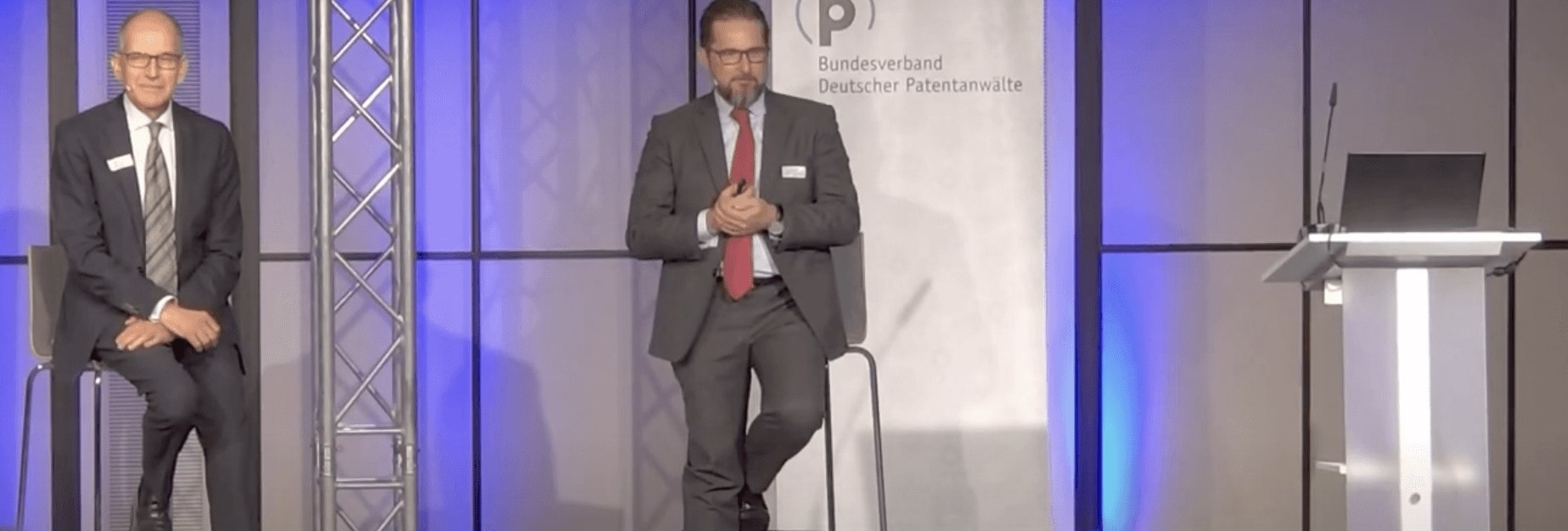
Latest News.
Video: Lecture by Dr Peter Kather and Dr Christof Augenstein at this year’s Autumn Seminar of the German Patent Attorneys Association
This year’s autumn seminar of the BDPA on the topic “Patent infringement in focus – strategic aspects from avoidance to enforcement” took place on 07. and 08. October 2021 in Dusseldorf. The series of events was broadcast via livestream.
We are pleased about the great response and interest in the presentation by Dr Peter Kather and Dr Christof Augenstein on the topic of “German patent infringement litigation – tactics disclosed in dialogue”. As a follow-up, the BDPA now makes the complete video recording available here. [German]

Aktuelle News.
JUVE Patent Ranking 2021: Kather Augenstein again among the top IP boutique firms and leading IP specialists in Germany
Every year, law firms are subjected to comprehensive evaluations in rankings. We are very pleased that our boutique law firm was again able to defend its ranking of previous years in the current edition of the high-quality JUVE Patent Ranking 2021. We are still awarded four stars, the second highest rating, and listed in the third highest group of patent attorneys.
Furthermore, we are again represented in the category Leading Consultants/Leading Individuals. In addition to our senior partner Dr Peter Kather, this year, our partner Christopher Weber is additionally highlighted as a leading advisor among litigators in patent law in Germany.
Special thanks go to our peers and clients, who gave special commendations to no less than four of our partners and IP specialists, recognising Dr. Peter Kather as “experienced and outstanding”, Miriam Kiefer as “very client-oriented”, Christopher Weber as “technically adept, internationally positioned and highly focused”. Clients also underlined the working method of our name giver Dr Christof Augensteinas “terrific, how fast he is in the case”.
“The special honor of our firm is never the result of a single person, but rather of our entire team. The current JUVE Patent Ranking 2021 is based on feedback from our clients and peers, we see this as an incentive for future success and thank the experts for their recommendations”, says Dr Christof Augenstein.
